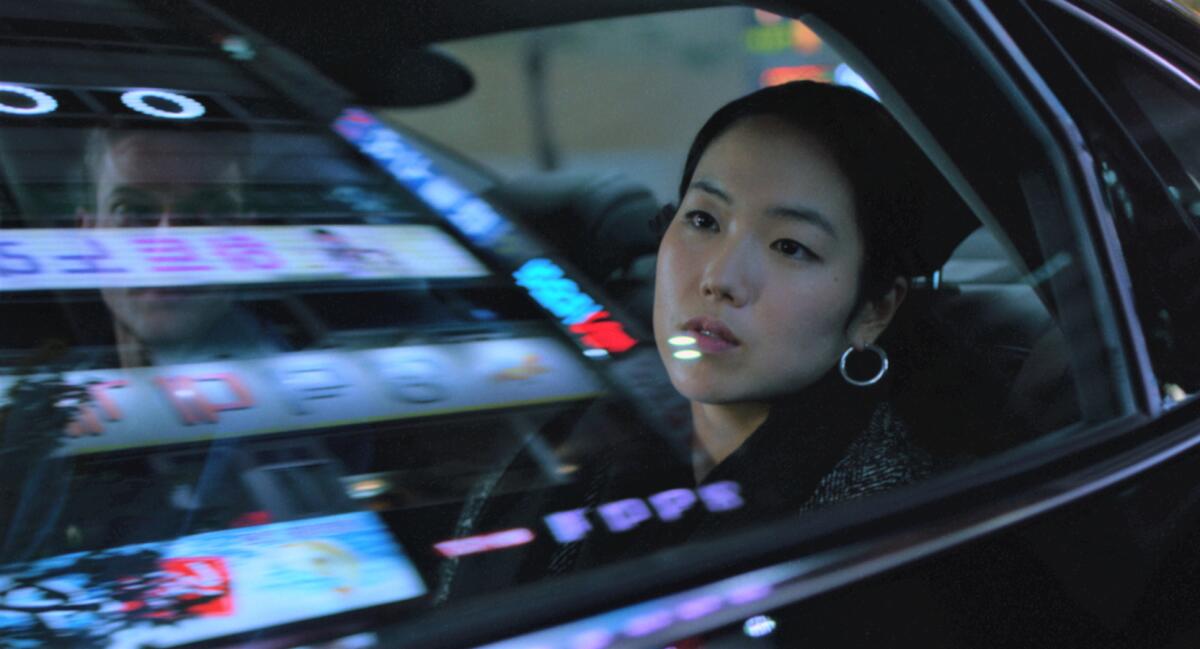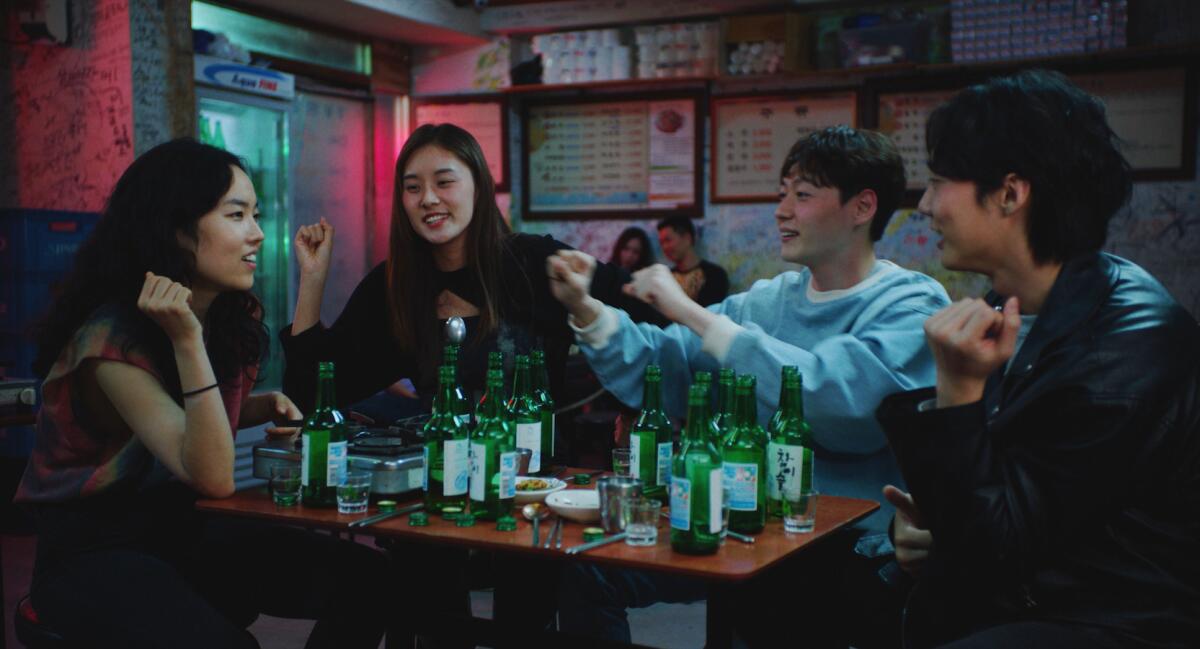Review: Davy Chou’s exuberant ‘Return to Seoul’ ponders a young woman’s constant evolution

- Share via
On one of the first nights of her seemingly impromptu trip to Seoul, Freddie (Park Ji-Min), a magnetic 25-year-old adoptee born in South Korea but raised in France, explains the concept of sight reading to a group of new acquaintances over copious bottles of soju.
To play a score for the first time, musicians — which Freddie once was — must quickly gauge its degree of difficulty, the danger if you will, and then dive in fearlessly. That too is how Freddie chooses to walk the Earth, plunging into the unknown head on and picking up the shattered pieces later. Shape-shifting through the years, she rolls with the tide of change.
For your safety
The Times is committed to reviewing theatrical film releases during the COVID-19 pandemic. Because moviegoing carries risks during this time, we remind readers to follow health and safety guidelines as outlined by the CDC and local health officials.
The impulsive young woman commands French Cambodian writer-director Davy Chou’s “Return to Seoul.” Told with great stylistic exuberance, the electric and segmented drama brilliantly muses on the impermanence of everything we know — about ourselves, about others and the world — and points to transformation as the only inevitable constant.
“There are signs all over that you don’t see, but you can learn to read them and catch them when they appear,” Freddie tells her drunken audience before orchestrating conversations between strangers. Her instructions also provide guidance for us to engage with the story.
A staggering masterwork that reveals itself unhurriedly, one permutation at a time, Chou’s third feature is perhaps the only film this year in which every single scene and every line of dialogue within them feel absolutely indispensable. The richness in every detail, and their unexpected ramifications over time, make for a one-of-a-kind character study.

Encouraged by Tena (Guka Han), her new friend and guesthouse attendant, Freddie visits the Hammond Adoption Center to inquire about her biological parents. A tattered photo of herself as an infant in the arms of a woman she believes to be her birth mother opens the door to a possible meeting. But first, her Korean father (Oh Kwang-rok) comes forward.
In her initial encounter with her paternal blood family, the swirl of language barriers, culture clashes and a mutual, if unspoken, eagerness for connection knocks the nonchalant coolness out of Freddie. From their time together, she discovers the name they gave her, Yeon-Hee, and the challenging financial circumstances behind her adoption.
Initially, Tena, fluent in French and familiar with Korean sensibilities, intercedes to facilitate communication, sometimes defusing Freddie’s anger in translation, finding kinder words to convey her answers or appealing to the heroine’s better angels in search for compassion. In most instances, however, emotion needs no interpreting, like when her grandmother cries inconsolably, and in others, English operates as a broken intermediate language.
There’s no instant bond of kinship, just the burden of her father’s expectations for a relationship and his guilt, manifested in late-night, inebriated text messages that Freddie cannot fully understand but knows are charged with pent-up regret. In truth, the two are, for now, not much more than an appendix in each other’s lives, a testament of what wasn’t.
On Park’s miraculously expressive face, we can read that Freddie ponders in silence not only who she would have become had she stayed in South Korea, but also who she would have continued being had she not met these people. This fork in the road highlights that few aspects of our foundational experiences are solely ours — even her past as a pianist derived from her adoptive parents.
A perceptive Tena can see through her façade of indifference and into her quiet unraveling. And as Freddie dismisses the advances of a casual sex partner, enticed by her Western self-assurance, Tena asks her to consider for a moment the local point of view on romance.
Freddie responds, “But I’m French,” to which her patient pal retorts, “You’re also part Korean.” Is it possible for her to be both of these at once within the same lifetime, camouflaging across continents? Definitely. Could she ever become Yeon-Hee? Maybe a version of her, but never the one her Korean relatives may have imagined on their own.
Halfway through Chou’s sublimely written and sleekly photographed portrait inspired by a personal friend, the narrative propels us two years and then five years into the future.
Chaos embodied, Freddie now walks the streets of Seoul wearing dark lipstick and the confidence of familiarity with the surroundings. But like everything else, this feeling is temporary. Later, she will yet again feel out of place in a mostly foreign land. It’s in the physical and tonal transitions that each time jump brings about that the magnitude of Park’s performance, one of stunning emotional versatility, begins to set in.
Tucked into an uninhibited laugh, a stern gaze or a vigorous dance, the astounding actor personifies the process of a relentless evolution. That “Return to Seoul” represents her first-ever role in a feature production is hard to believe. Park’s artistry of incarnation beguiles both in the subtler calibrations and when Freddie’s defense mechanisms take over the spotlight with violent abandon, as if to remind the world that she is a part of it, an uncontrollable force that must stay in motion to survive.
For every posed question, Chou offers a surprising outcome. Latter chapters in the decade for which we follow Freddie, for example, see her picking up a few phrases in Korean. Every new word learned is a building block of a makeshift bridge between her and her father. And as she changes, more times than we can predict, he changes too, slowly.
Notably, music emerges as the most honest vehicle for them to bond over, and as the cinematic element that most closely parallels Freddie’s metamorphoses. Chou’s chosen cues and Jérémie Arcache and Christophe Musset’s score sonically map her inner discovery with an expertly deployed collection of upbeat, melancholy and transfixing tracks.
Via the cosmic waltz of what-ifs, why-nots, what-nows rushing through Freddie, it becomes clear that the wound of disconnection never fully heals for those with interstitial identities. She can only control what parts of each to nurture, and what path to walk onward with them.
At one point, a high-stakes professional opportunity exploits her fragmented sense of self, with Freddie advocating for European interests in South Korea. And for a while, this further complicates her understanding of the layers that comprise her. Luckily, a career detour, a shorter haircut or a new diet don’t define her essence; she still knows how to sight-read without restraint.
Worthy of multiple viewings, “Return to Seoul” establishes that in our fixation with resolutions, with the certainty of forever-afters, we fail to realize that human existence entails pausing and restarting, forgetting and remembering, hurting and forgiving, learning and leaving behind. Nothing is definitively lost nor permanently gained, but all is cycling within us, always, as we contain all the people we once were and all of those we’ll never be.
‘Return to Seoul’
In English, French and Korean with English subtitles
Rated R for brief drug use, nudity and language
Running time: 1 hour, 59 minutes
Playing: Starts Dec. 2, Laemmle Royal, West Los Angeles, for one-week awards-qualifying run; opens Feb. 17, 2023
More to Read
Only good movies
Get the Indie Focus newsletter, Mark Olsen's weekly guide to the world of cinema.
You may occasionally receive promotional content from the Los Angeles Times.










